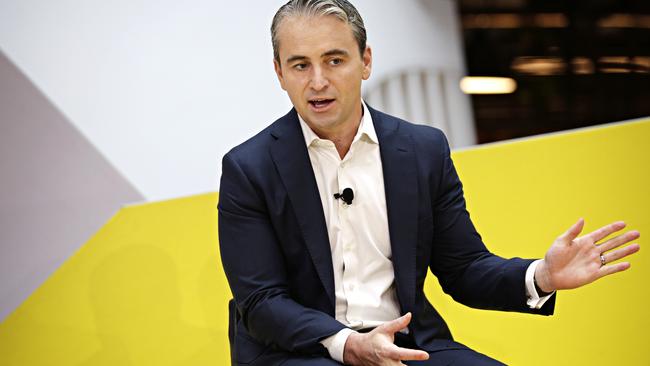CBA ramps up technology investment to top $6bn, value of Klarna stake swells
Commonwealth Bank ratchets up tech investment over five years to more than $6bn, as the value of its share in Klarna balloons.

Commonwealth Bank is ratcheting up its technology investment over five years to more than $6bn, and has seen the value of its stake in Sweden’s Klarna balloon by more than six times.
CBA chief executive Matt Comyn talked up the bank’s technology credentials at a biannual briefing on Thursday, at which he said CBA was so far exceeding its $5bn investment target over five years.
He foreshadowed that the bank’s technology spend over the period was likely to be more than $6bn, as it sought to deliver highly personalised services to customers and stay at the forefront of evolving developments in banking and payments technology.
“That’s probably a safe assumption,” he said of the more than $6bn figure. The bank’s actual technology investment will be released in February, when it delivers its first-half earnings.
“You can probably reasonably conclude from the conversation today we’ve got a bold ambition in this space, and it’s going to require investment.”
Mr Comyn said the run rate of CBA’s investment in the area was closer to $1.5bn annually, with the bulk of that being technology, but also including boosting the capability of risk management and other systems.
He noted the preparedness of CBA to make investments in key technology for the long term, and said artificial intelligence and machine learning were “hugely important” for financial institutions.
CBA is of the view that customers are benchmarking the bank not just against other financial institutions, but comparing other digital experiences from companies and service providers they deal with.
Mr Comyn also admitted CBA could be moving at a faster clip on its technology investment and rollout.
“There are many areas of our technology which I’d like us to be going much faster,” he said.
Mr Comyn was also asked about the bank’s actions around cybersecurity and protecting big data.
He said there was a wariness among many customers to share data across companies. Being transparent about big data was essential.
“The way that we and many others really think about managing customer consent, and privacy and being very clear on what we will and won’t do with customers’ data is critical... it’s incumbent on large organisations like us to protect our customers’ data, but also to make sure that we’re providing meaningful benefits to help them live their lives more effectively.”
On the buy now, pay later sector, Mr Comyn said while he believed more regulation was inevitable he remained upbeat on the bank’s stake in, and partnership with, Sweden’s Klarna.
Given the bulging valuation multiple of ASX-listed rival Afterpay and the more than doubling in US player Affirm’s share price on listing this month, Mr Comyn pegged Klarna’s valuation at about $US40bn.
“It’s in that order and it has certainly increased very significantly over the last 12 months in particular,” he said.
Based on the paper valuation, CBA’s holding is worth about $US2bn, up from its initial investment of $US300m, made over two tranches. The bank’s partnership with Klarna sees it as an equal partner in the Australian and New Zealand roll outs.
Mr Comyn wouldn’t comment on the prospects for a Klarna initial public offering and CBA’s intention to participate, but said: “We see the partnership as being very long term.”
Klarna has attracted 575,000 Australian customers since its launch a year ago.
CBA on Thursday separately said it had applied for accreditation to take in data as part of the federal government’s open banking regime, which gives customers more control of their data.
The update also included an announcement that CBA’s startup platform x15 - which helps build and develop new ventures - had acquired a fifth venture Doshii, a cloud platform for the hospitality industry that integrates sales and processes.
More broadly, CBA said it had seen an accelerated take-up of its digital banking services during the pandemic, with 7.5 million customers digitally active across its platform. That was up 10 per cent on December 2018.
The bank also said about 6.5 million customers were using its app as at December, up from 5.9 million a in the same month in 2019, and that more than 400,000 customers had set up a coronavirus money plan since mid last year.






To join the conversation, please log in. Don't have an account? Register
Join the conversation, you are commenting as Logout